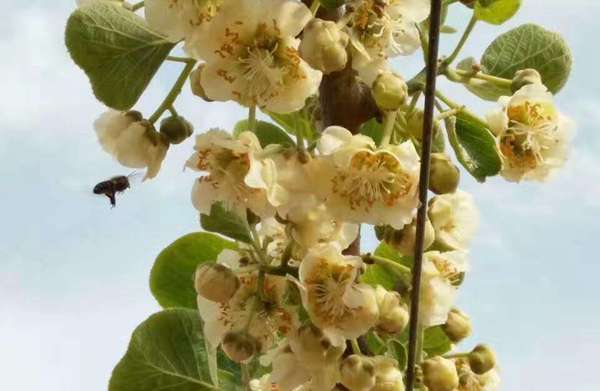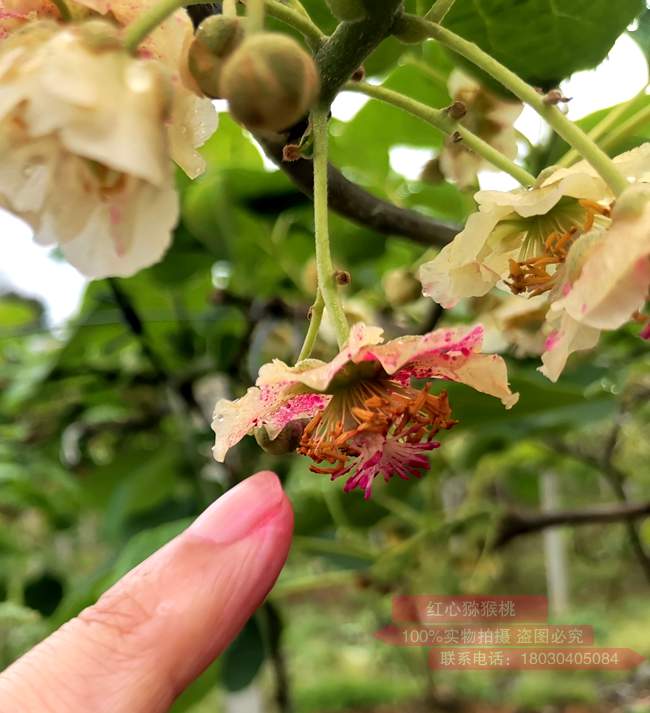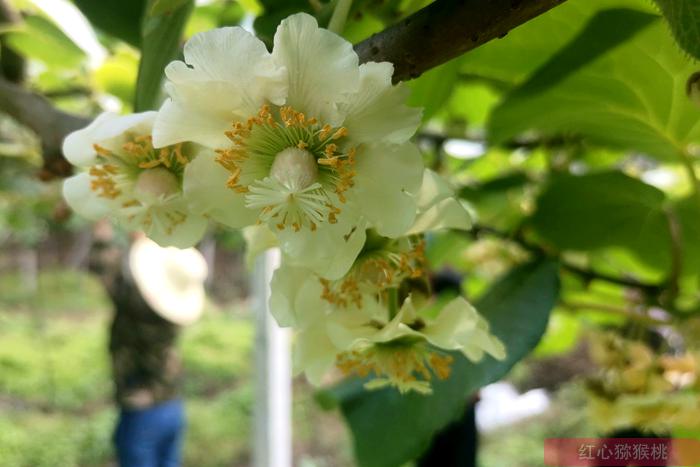While pollination is necessary for the production of most of the fruits and vegetables we eat, it is even more mandatory for kiwi. Efficient and intense pollination is needed to grow beautiful big kiwis, as we like them.
虽然我们吃的大多数水果和蔬菜的生产都需要授粉,但对于猕猴桃来说,授粉更为必要。想要培育出我们喜欢的果形漂亮的大个猕猴桃,需要高效而频繁的授粉。

▲Kiwi pollination by honey bee
Kiwi yards are very common in the Pyrénées-Atlantiques. It is an agricultural sector still growing and, like many other crops, also facing the risks and hazards of nature. The stakes are high and there is still too much to be learnt. This is why we enrolled into the monitoring of the love affairs between kiwis and bees.
奇异鸟码在比利牛斯-大西洋地区非常常见。这是一个仍在增长的农业部门,与许多其他作物一样,也面临着自然的风险和危害。风险很高,而且还有太多东西需要学习。这就是我们参与监测奇异鸟和蜜蜂之间爱情关系的原因。

▲Kiwifruit pollen price
What is cross-pollination?
Actinidia (the kiwi plant) is a dioecious plant, which means that there are male and female plants. In order for the female flowers to be fertilized, the transfer of pollen from the male plants to the female plants must take place. This is called cross-pollination. In other words, the male plants will carry the pollen and the female plants will carry the flowers producing fruit.
什么是异花授粉?
猕猴桃(猕猴桃植物)是雌雄异体植物,这意味着有雄性和雌性植物。为了使雌花受精,必须将花粉从雄性植物转移到雌性植物。这称为异花授粉。换句话说,雄性植物负责产出花粉,雌性猕猴桃将携带产生果实的花。

▲新西兰阳光金果
Therefore, there are two main constraints. The first one is that male plants have to be grown close to the female plants. A ratio of 1 male for 5 females is often found. The second is that the transfer of pollen cannot be done by wind; the presence of pollinating insects is crucial : Actinidia depends at 95% on pollinators.
因此,有两个主要限制。第一个是雄性植物必须靠近雌性植物生长。经常发现 1 男 5 女的比例。第二,花粉的传播不能通过风来完成;传粉昆虫的存在至关重要:猕猴桃95%依赖传粉媒介。

▲Kiwi pollination by honey bee
Beyond the necessity of cross-pollination, the actinidia is not a plant like the others. Each flower has a lot of stigmas (about 40) and ovules (about 1500). Once deposited on the stigma, the pollen grain creates a pollen tube which crosses the style conveying the male gametes to the ovule. A lot of pollen grains will therefore allow the fertilization of a lot of ovules. In other words : the more intense the pollination, the best the fecundation which results in beautiful kiwis.
除了异花授粉的必要性之外,猕猴桃与其他植物不同。每朵花都有很多柱头(约40个)和胚珠(约1500个)。一旦沉积在柱头上,花粉粒就会形成花粉管,该花粉管穿过花柱,将雄配子输送到胚珠。因此,大量的花粉粒将使大量的胚珠受精。换句话说:授粉越多,受精效果越好,从而产生果形漂亮的大个猕猴桃。

▲Kiwi pollination by honey bee
If this seems complex, there is a third constraint: Actinidia is also a bit stingy. It has plenty of pollen, but no nectar. Zero nectar with actinidia! Of course, bees do not like stingy plants and can quickly become disenchanted and go elsewhere.
如果这看起来很复杂,那么还有第三个限制:猕猴桃也有点小气。它有大量的花粉,但没有花蜜。零花蜜与猕猴桃!当然,蜜蜂不喜欢小气的植物,很快就会失望而去别处。

▲Kiwi pollination▲
Pollinating kiwi is quite a program
Let’s make a summary of the case: we have a crop which must transfer pollen from a male plant to female plants with the help of insects. The pollen load must be important to fertilize the hundreds of ovules of each flower and moreover the insect will not have any reward in nectar for job motivation .
给猕猴桃授粉是一项艰巨的任务
让我们总结一下这个案例:我们有一种作物,必须借助昆虫将花粉从雄性植物转移到雌性植物。花粉量对于使每朵花的数百个胚珠受精必须很重要,而且昆虫不会因为工作动机而获得任何花蜜奖励。

▲Extraction of pollen grain from anther
At this point it's clear that if you want nice kiwis, you need lots and lots of bees, efficient bees! And therein lies the question: how does pollination actually happen? What are the main drivers? How does it evolve over time?
很明显,如果你想要美味的猕猴桃,你需要很多很多的蜜蜂,高效的蜜蜂! 这就是问题所在:授粉实际上是如何发生的?主要驱动因素是什么?它如何随着时间的推移而演变?

▲Kiwi Orchard Work
This is what we intended to monitor in May 2021 in a kiwi farm, close to the town of Oloron in the Atlantic Pyrénées.
这是我们计划于 2021 年 5 月在大西洋比利牛斯山脉奥洛龙镇附近的一个奇异果农场进行监测的情况。

▲Kiwi pollination by honey bee
Real time monitoring of kiwi pollination
Actinidia blossom takes place between May and June. To follow the whole pollination, hives were equipped from May 17 to June 9, i.e. 22 days, in a 3 hectare kiwi crop.
猕猴桃授粉实时监测
猕猴桃花期在五月至六月之间。为了跟踪整个授粉过程,从 5 月 17 日到 6 月 9 日,即 22 天,在 3 公顷的猕猴桃作物中配备了蜂箱。

▲Kiwi insect pollination
In total, 3 hives were connected, each with a scale, an internal sensor and a bee counter. The scales were custom-made to fit the frames used by the beekeeper, from the DIY kit. Nearby are installed a weather station and a Hub, which will allow us to monitor remotely.
总共连接了 3 个蜂箱,每个蜂箱都有一个秤、一个内部传感器和一个蜜蜂计数器。这些秤是根据养蜂人使用的框架定制的,来自 DIY 套件。附近安装了一个气象站和一个集线器,这将使我们能够远程监控。

▲播宏果业正在采摘猕猴桃雄花蕾
Custom-made hive scales
Bee counter
The scale tracks the weight of the hive and informs about stores consumption or gain. Kiwifruit produces very little nectar, so the bees should only bring in pollen and draw on their reserves for the rest. The internal temperature sensor can be used to determine the amount of brood and the health of the bees. The bee counter, installed at the entrance of the hive, gives information on the entry and exit of the bees. It makes it possible to know when the bees leave the hive the most, in what kind of weather, etc. These measurements correlated with the indications given by the ambient measurements make it possible to characterize the course of the pollination campaign.

▲Kiwi Orchard Work
定制蜂巢秤
蜜蜂计数器
该秤跟踪蜂巢的重量并告知商店的消耗或增益。猕猴桃产生的花蜜很少,因此蜜蜂只能带来花粉,并利用其储备来完成其余的工作。内部温度传感器可用于确定蜂巢数量和蜜蜂的健康状况。蜜蜂计数器安装在蜂巢入口处,提供蜜蜂进出的信息。它使得能够知道蜜蜂何时离开蜂巢最多、在什么样的天气等。这些测量与环境测量给出的指示相关,使得能够表征授粉活动的过程。

▲干燥猕猴桃花粉
Spin-offs
At the end of the campaign, which lasted 22 days, we acquired a very consequent database that teaches us a lot. The analysis is still in progress but already, very clearly, there are several aspects that can be advantageously exploited by the beekeeper and/or the farmer:
衍生产品
在持续 22 天的活动结束时,我们获得了一个非常重要的数据库,它教会了我们很多东西。分析仍在进行中,但非常明显,养蜂人和/或农民可以有利地利用几个方面:

▲sungold g3 kiwi orchard
Monitoring and forecasting the dynamics of the colonies allows the beekeeper to identify in time the necessary actions, especially for feeding. We are talking here about prevention rather than cure. It is necessary to preserve the colonies from weakening because the next nectar flow (chestnut) is at stake.
监测和预测蜂群的动态使养蜂人能够及时确定必要的行动,特别是在喂食方面。我们在这里谈论的是预防而不是治疗。有必要防止蜂群衰弱,因为下一次花蜜流(栗子)处于危险之中。

▲Kiwi pollination▲
For the farmer, we have seen at what point the bees lose interest in the crop and move on to "something else". This combined with a week of bad weather will result in lower efficiency and an actual pollination that lasted a handful of days.
对于农民来说,我们已经看到蜜蜂在什么时候对农作物失去兴趣并转向“其他事情”。再加上一周的恶劣天气,将导致效率降低,实际授粉会持续几天。

▲sungold kiwi orchard
With these data and lessons learned, we are already looking forward to the next flowering. For sure, next year we will be able to plan ahead for this type of operation to improve its efficiency.
有了这些数据和经验教训,我们已经期待着下一次的繁荣。当然,明年我们将能够提前计划此类操作以提高其效率。

▲正在采摘猕猴桃雄花蕾
If the next time at the supermarket you find big and beautiful kiwis, tell yourself that BroodMinder may have been there
如果下次你在超市发现又大又漂亮的猕猴桃,告诉自己宝宝猕猴桃起点可能就在那里。

▲猕猴桃雄花蕾

▲Golden Kiwi

▲Health Benefits of Kiwi Fruit

▲Photo of red kiwi fruit pollination









